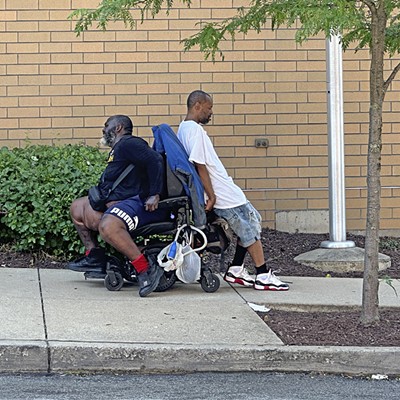For a woman sitting on a sidewalk hoping passers-by will throw spare change into a cardboard box, Dot is in a surprisingly good mood. In an informal survey of Downtown panhandlers, she was the only one who said she knew anything about a new city ordinance that could put a crimp in her livelihood.
Dot has been following the events in the news. She immediately recites the locations and distances she'll soon be forced to adhere to, if Mayor Tom Murphy signs city council's legislation into law as he is expected to do. She won't be able to ask for money between sunset and sunrise, within 10 feet of food vendors and bus stops or 25 feet of outdoor restaurants, ATMs, people waiting on line at events, and, oddly enough, places of worship. First offenses garner a warrant; further offenses could lead to fines, community service or jail. Aggressive panhandling will receive tougher treatment.
It won't be hard for her to comply, she says. When the manager of the pharmacy up the street asked her to move, she says, she did. If somebody complains about her location to the police, she's willing to pick up and move down the street. She's used to jumping through hoops.
"The law is the law," she says. "I can't fight it, so I'll do exactly what they tell me to do. As long as I do that, they can't stop me from being out here. I'm not hurting anybody. I'm just asking for a little help to get through the day."
At least Dot, with a weathered face and blue winter jacket to match, has a home to go to later: a small subsidized apartment for seniors that takes pretty much all of the $220 a month she gets from welfare, but which allows her to watch the television news. Her gas has been turned off for what she says is about $200 in late payments.
"I'm not trying to get rich," she says. "At 75, there's no work for me and I have to eat. At 75, I shouldn't have to be out here, but it's tough to get by in the system."
She says hello to everyone who passes, hoping they'll catch a glimpse of her hand-written cardboard sign. So far there's 50 cents in her box, but she's not worried. She'll sit in front of this abandoned storefront on Forbes Avenue, about halfway between Wood Street and Market Square, until she gets what she needs for the day. By 2:30 p.m. this Thursday afternoon she's already gone.
It's uncertain how many panhandlers know they'll need to be gone by sundown -- 5:09 p.m. on Nov. 8, and getting earlier -- or that they can't arrive before sunrise, which is now approaching 7 a.m. And it remains uncertain whether, or how, the people most affected by the ordinance will find out about it, except from the police.
The new panhandling regulations were initiated this summer by several groups, most prominently the Pittsburgh Downtown Partnership. First-time offenders are given a warning and the chance for a consultation with a social-service agency, but after that the penalties kick in. The law continues to elicit concerns about free speech from the American Civil Liberties Union and several non-profit organizations, including the Salvation Army, who not only assist the needy but also count on a form of panhandling: holiday bell-ringers who help support the agency's programs.
"It was never communicated how this information would be shared with the people it affects the most," says Salvation Army Major Jim Labossiere, speaking about panhandlers the agency aids. "Once the final draft is supplied to us and once we gain a clear understanding of the law, I think [social service agencies] need to break it down into a one-page form or card that people can [read] through so they can be informed."
While his group's own solicitations seem to be protected under the new ordinance, says Labossiere, he worries about individuals who will be forced to live under the new law. He says agencies like his are going to have to figure out strategies to adequately help those "who may be directed out of panhandling."
Michael Edwards, president and CEO of the Downtown Pittsburgh Partnership, says the panhandling ordinance is just part of the answer to the panhandling-related issues facing Downtown customers and merchants. Some panhandlers, he says, block storefronts and hassle potential customers and employees. The Partnership and other groups also started an anti-panhandling education program for those who visit Downtown with the slogan, "The more you give change, the more things will stay the same."
Edwards says the new ordinance gives officials the ability to manage panhandling by controlling the time, place and manner in which panhandling can occur -- three ways in which free speech can be regulated and still pass muster in the courts.
"We recognize that we can't stop people from panhandling," Edwards explains. "But we had to try and help Downtown merchants manage a pretty unmanageable thing. I believe we were sensitive to the rights of the people who panhandle, but at the same time, we were concerned with the rights of the merchants, customers and visitors to equally enjoy the Downtown."
Zone 2 police Commander Paul Donaldson realizes it won't be easy to notify those the ordinance most immediately affects. He envisions a grace period of about 30 days before officers begin issuing first-offense warnings. That doesn't include aggressive panhandling, however, which will result in an arrest even on the first offense.
There's a fine line, Donaldson says, between aggressive panhandling and robbery, and the charge is always taken seriously. Currently, Donaldson estimates that his officers issue about 10 to 20 citations per month for charges relating to panhandling. According to Deb Weber of the Administrative Office of Pennsylvania Courts, 37 citations for aggressive panhandling, panhandling within 10 feet of an ATM and panhandling in general have found their way into the court system since January 2004. That total does not include any other possible panhandling-related offense -- like disorderly conduct.
The real problem, Donaldson says, is aggressive panhandling. He believes the new law shouldn't greatly affect either passive panhandling or those who are truly needy.
"We can't force anyone into taking the social-service consultation, but our officers are certainly going to offer it," Donaldson says. "What I see, however, is [that] a large percentage of the panhandling in this city isn't done by people who are needy or indigent, but rather by people who do it in lieu of other employment."
Bruce Hughes, shelter director at the Northside Common Ministries, says he doesn't necessarily agree with Donaldson's assumptions. Hughes says the ordinance won't likely affect the people that he sees in the shelter, but will have a significant impact on "street people," those who don't come to the shelters for help but prefer to live on the streets.
It's unfair to say that a large number of people who rely on panhandling aren't needy just because they may not be homeless, Hughes adds. The government subsidy most people get -- around $200 monthly, like Dot -- isn't enough money to live on. There simply isn't enough money out there to meet the needs of people, he concludes.
"Whether or not a person -- be they helpless, needy, homeless or the working poor -- gets some kind of subsidy is no reason to arbitrarily say whether or not that person needs to panhandle to make ends meet," Hughes says. "In a lot of cases I think people take the worst examples of a situation, like aggressive panhandlers, and generally apply that across the board to everyone in the streets because it's easier to sell that image. That's unfair and unfortunate."
Tom Lazar of Light of Life Mission says his staff is already informing the shelter's clients about changes in the law, although most of their clients are "hardcore homeless people" who don't ordinarily get involved in panhandling.
"It's not that [the new law] is a non-issue for the people we come in contact with," Lazar says.
One of the main civil-liberty issues with the ordinance, says Barb Feige, director of the local ACLU office, are the time restrictions on speech. Originally, the ordinance set specific times for panhandling. The final draft's sunset-to-sunrise panhandling prohibition could still be a problem, Feige says.
"There's no Cinderella clause to the First Amendment," she explains. "Your right to free speech doesn't go away at a designated hour or when the sun goes down. Besides, who decides that it's adequately dark enough to say the sun has set, or light enough to determine that the sun has risen? Is that at the discretion of the police officer? It's just awkward to try and legislate this."
Meanwhile, there's only so much assistance and only so many subsidies to go around. As a stranger tosses 85 cents into Dot's cardboard box, she recalls a recent meeting with an agency she approached for help.
"They told me I qualified for help -- that was the good news," she recalls. "The bad news was they didn't have any money to give me. Now what does that tell you about the system? It says the system is broken. But it's the only system I have to work with. So no matter what the law is, I'll have to make it work."












